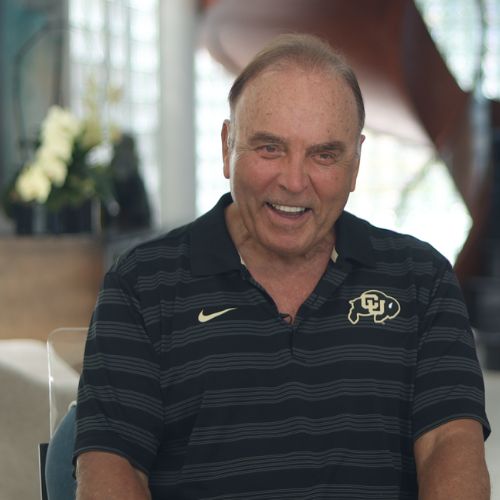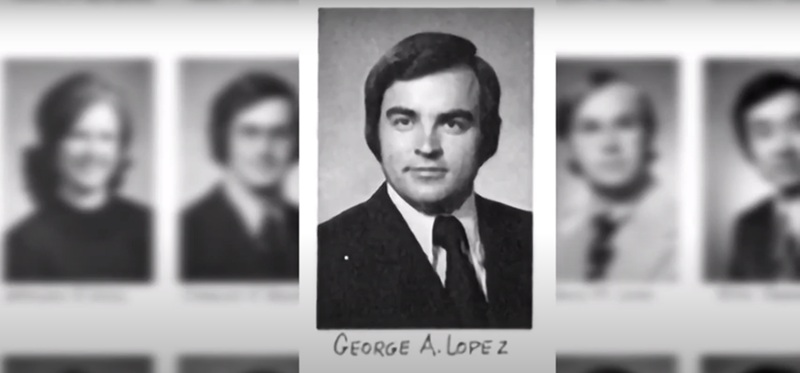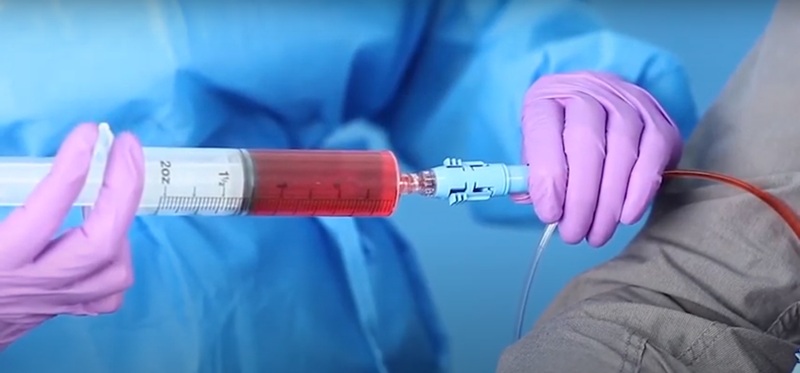CU Alumnus George “Doc” Lopez Receives Honorary Doctorate of Humane Letters
Written by Danielle Davis
Apr 10, 2023
George “Doc” Lopez, MD ’73, embodies what many aspire to achieve in their lifetime – passion and purpose. Described as the “quintessential entrepreneur,” Lopez has been working to change the world for the better part of his life. His inventive spirit, insatiable appetite for knowledge, and kindness and generosity has made an invaluable mark in healthcare, patient care and medical education.
From his time as a medical student at the University of Colorado School of Medicine, to becoming a renowned physician-turned-business mogul who developed technologies and created a company that would grow to become essential to IV medication delivery around the world, to a philanthropist who wanted to “pay forward” the opportunity for other first-generation and financially struggling students to attend medical school, to a champion of stem cell research in the face of his own diagnosis with Parkinson’s disease, Lopez is a force to be reckoned with.
Each year, the CU Board of Regents, along with faculty members from each campus, award extraordinary individuals with honorary degrees; this is the highest award the University of Colorado can bestow. In recognition of his outstanding achievements in improving patient care and the practice of medicine, the University of Colorado will honor Lopez with an Honorary Doctorate of Humane Letters at the CU School of Medicine’s spring commencement ceremony this year.
Few CU MD alumni have earned an Honorary PhD – an accolade that Lopez sees as the pinnacle of his career. In 2018, he was honored by the CU School of Medicine Alumni Association with the Distinguished Achievement Award for work benefiting the community, the field of medicine and the provision of healthcare.
He has become something of a legend at CU, according to CU President Todd Saliman. “After receiving his medical degree from CU in 1973 … he used his medical education and natural curiosity to guide him in his endeavors.”
While Lopez is recognized as a thought leader and pioneer in the medical community who invented several medical safety devices, it is his generosity of spirit that makes him a giant among men. By establishing the Doc Lopez Scholarship Fund, he has given millions in scholarship support for students who are traditionally underrepresented in the medical profession.
As John J. Reilly, Jr., MD, Dean of the CU School of Medicine and Vice Chancellor for Health Affairs noted in his nomination letter for the Honorary PhD, “Doc embodies the compassion, ambition and gracious spirit of an ideal candidate for an Honorary Degree from the University of Colorado. This honor is a fitting recognition to a career spent in service to others.”
A spirit of inquiry
Some people know exactly what they want to be when they grow up. For Lopez, there was never a doubt in his mind that he was meant to be a doctor and care for others. “I wanted to become a doctor because there was a doctor who took care of me,” he says.
When he was six months old, Lopez fell very ill with whooping cough and a few pulmonary diseases; his chance of survival was near zero. Growing up in an impoverished neighborhood, money was tough for Lopez’s family. At the time, the doctor told his mother she had a choice of taking him home to take care of him, or she could let him die in the hospital. The choice was easy; she converted their home into a makeshift care facility under the doctor’s instructions, even putting filters on the windows.
“I can remember very vividly that my mother thought a doctor was the highest form of life you could achieve,” he says. “If anybody said something bad about a doctor, she would deck you.”
The innate desire to be a student of the world fueled Lopez to learn as much as he could. When it came time to pick a major during his college years at San Jose State University in California, Lopez didn’t know what to select; he jotted down chemistry because he was good at it, but eventually changed his major to medicine after seeing a picture of medical students wearing University of Utah jackets caring for a patient.
“I thought, ‘boy, I would love to be part of that group,’” he says. “Every night, before I walked home from the library, I wrote ‘George A. Lopez, MD’ in my notebook.”

Yearbook photo of George “Doc” Lopez, MD ’73.
His grit and excellent grades culminated in him receiving scholarship support to attend the CU School of Medicine his junior year, a rare accolade for an out-of-state student in 1970, made even rarer by his ethnicity as a Hispanic in a predominately White field of study. Back then, diversification wasn’t a factor for enriching the student experience, but Lopez worried he was seen as a consolation prize.
“I remember going to the dean’s office to ask him if I was qualified enough,” he recalls. “The dean told me I was more qualified than anybody in the class, and that I deserved to be here. I ended up testing out of our first medical physics class when everyone else failed the first exam. I was really tickled pink by that.”
It became clear that no one should ever bet against Lopez. After graduating in 1973 with his medical degree, Lopez worked as an ICU medical doctor and board-certified internist. Ever the boundary-pusher who rejected the status quo of ‘this is how we always do things,’ he innovated the standard of care after losing a patient when an IV line accidentally disconnected during a critical illness. After that fateful night, Lopez made it his mission to prevent such a tragedy from ever happening again, which drove him to design, develop and patent an IV hub-locking device later known as the ClickLock.
“I promised my patient’s wife that he was going to be okay,” he says. “I ended up having to make a phone call I really didn’t want to make. I was frustrated … I felt like I wasn’t making enough of a difference, so I made a prototype of the ClickLock out of wood and pitched it around the country until someone finally said yes.”

A healthcare professional demonstrates the use of the ClickLock device to securely
connect a syringe to medical tubing, facilitating safe fluid transfer.
This revolutionary locking device also protected healthcare providers from needle sticks and being exposed to diseases like HIV and Hepatitis B, which were skyrocketing in the early 1980s. Lopez soon founded ICU Medical with the goal of enhancing safety at the point of care, resulting in a long list of innovative IV therapy technologies. Today, ICU Medical is a $2.5 billion (annually) global manufacturer with 15,000 employees.
Driven to make a difference
Lopez’s zest for life-long learning and problem solving didn’t stop after his tenure at ICU Medical. In the face of his own personal health challenge with Parkinson’s disease, he took it upon himself to learn everything he could about immunology and invest in a research lab at Harvard University that is using stem cell technology to find a cure. Lopez also became the first patient to be injected with autologous stem cells through a technique that was developed in close collaboration with neurosurgeons at Boston’s Massachusetts General Hospital. The team is in the final stages of qualifying for Phase I clinical trials for this revolutionary technique.
“Parkinson’s is a tough one,” he says. “It’s the toughest struggle I’ve ever had to face, but we’re going to beat it. It will probably be too late for me, but I have to think about the million other patients instead of myself.”
With his remarkable professional success, Lopez has prioritized philanthropy. When asked what he’s most proud of, Lopez only has to look at the framed photos in his home office of the 14 students at the CU School of Medicine. His contributions to establish the Doc Lopez Scholarship Fund have made a profound impact in the lives of students from backgrounds historically underrepresented in medicine. These highly qualified and academically accomplished individuals share the same ambitious, glass-ceiling-shattering traits as Lopez – they want to change the world, they just don’t have the financial means. Receiving a four-year scholarship gives them the opportunity to pursue their dreams to practice medicine, free from the burden of debt.
“I wouldn’t be who I am today if I hadn’t gotten into medical school,” he says. “The best way to ensure others have the same opportunities I did is to invest in the next generation of medical students. Maybe one of those students will cure Parkinson’s, who knows?”
One of his scholarship recipients, Weston Durland, shared that being a part of the CU Anschutz community would not have been possible without his help. “It means so much that he wanted to take an active mentorship role in our lives, and he has given us quite a lot to be inspired and motivated by in his character and the kind of life he lives. Doc checks in on you, tells you that he believes in you, and tells you to keep kicking butt.”
It only takes one person to make a difference, and that’s what Lopez has manifested with his impact. The ripple effect of his generosity and medical accomplishments will be felt for generations; for this, Lopez is deserving of an Honorary PhD from the alma mater he continues to invest in.
“All I care about is making a difference,” he says. “I always ask myself, ‘Did I do enough to make an impact?’”
Without a doubt, 14 Lopez Scholars, 15,000 ICU Medical employees, and the millions of lives saved by his medical safety devices would agree with a resounding ‘Yes.’